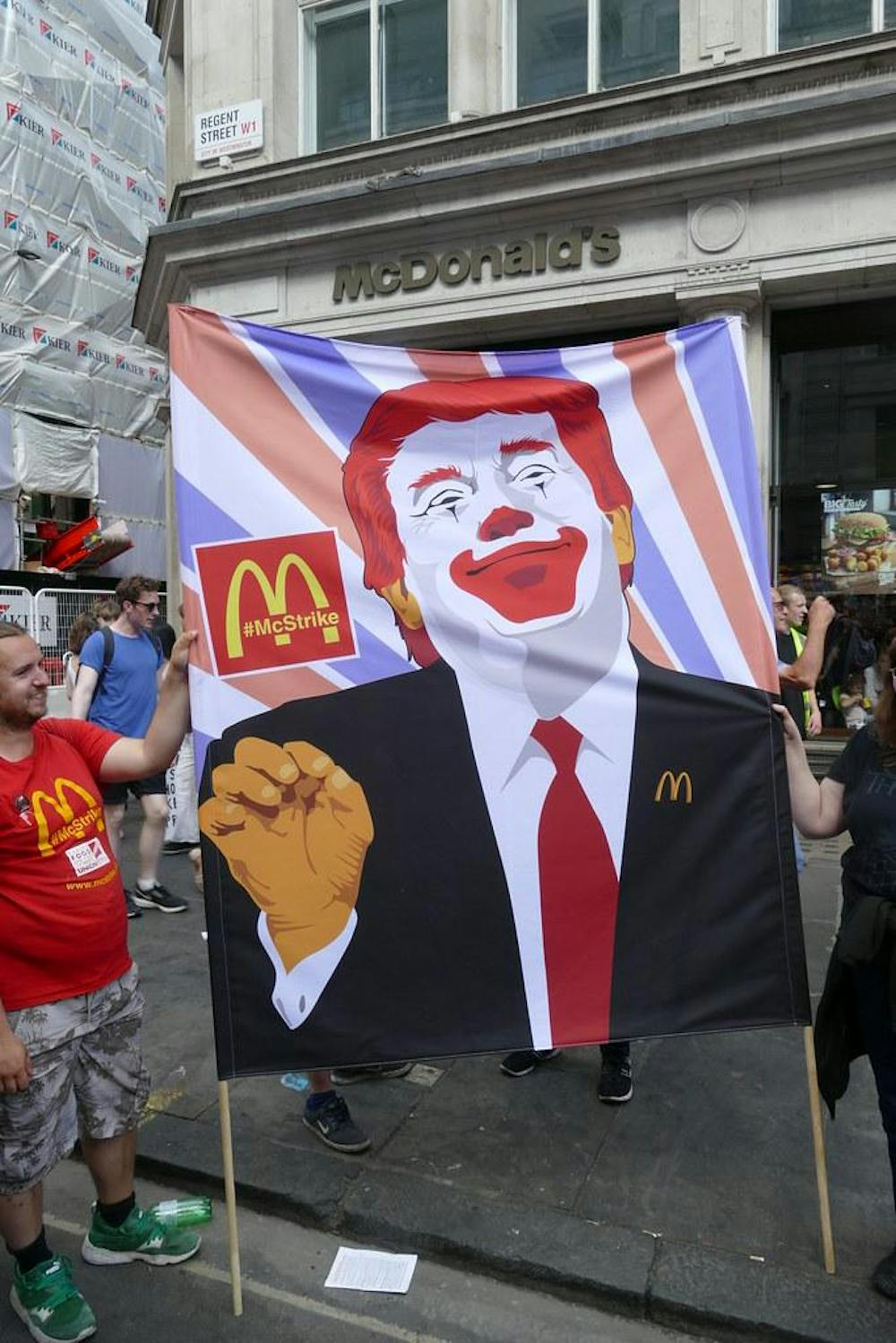As Election Day neared, Vice President Kamala Harris and former President Donald Trump vied for control of the spotlight. The two presidential candidates kept up futile attempts to one-up each other from their political soapboxes. At Trump’s Duluth, Ga., rally on Oct. 23, he welcomed Turning Point USA founder Charlie Kirk to the stage. A few days later in Atlanta, former President Barack Obama and musician Bruce Springsteen appeared on stage at Harris’ rally. Harris and Trump’s last-ditch displays were unequivocally flashy — this parade of celebrity endorsements is not new, but it is now paired with an overwhelming barrage of social media content, captivating the online world to the point of limiting Americans’ ability to think independently.
Over the past few months, the Harris and Trump campaigns have mastered crisp soundbites, performing candidity and tongue-in-cheek antics that sideline policy in favor of personality. The focus of the election has not centered on the changes or continuities of policy that each administration would bring to the White House but on the candidates’ characterizations. Their messaging, in a uniquely flippant and successful embrace of the digital age, has desensitized us to the ridiculousness of this election’s presidential spectacle, therefore trivializing a contest that will determine the future of our nation’s democracy.
This election cycle has unfolded with special deference toward molding a political character as a representation of policy. For the Harris team, known colloquially as Harris HQ, this means carefully building a persona for Harris that is steeped in charisma and relatability, relying on an aspect of familiarity for its tenacious rise. This means frequently staging events with a party-like atmosphere and aiming to connect with young voters by immersing her campaign in pop culture. Harris’ HQ campaign, decorated with a “BRAT green” backdrop, sets a scene designed to resonate with younger, progressive voters on the axis of “coolness” and inclusivity. This fun and accessible image, however, risks reducing serious policy conversations to fleeting cultural moments that overshadow substance.
Harris’ emphasis on lighthearted elements — such as prodding witticisms about her silk press or her recent endorsement from Beyoncé — shifts the focus away from her policies, reducing them to background noise amid the campaign’s cultural appeal. Recently, in an interview with NBC News, Harris was asked for her opinion on gender-affirming care for transgender Americans. Harris deliberately avoided stating her own opinion on this matter, most likely as to not disconcert the more moderate voter pool she has sustained throughout her run. This refusal to claim her own opinion on the matter of gender-affirming care seems directly at odds with her acceptance of LGBTQ+ imaging for her own platform gain. It appears that, pointedly, Harris will not be “bumpin’ that” anytime soon.
The Trump camp has also attempted to create the sensibility that Trump is one of us — a hard-working, red-blooded American who knows the perils of sweating into the fry basket for minimum wage. This man-of-the-people portrayal is filled with tongue-in-cheek stunts, dancing clips and casual language to connect with a base that sees itself reflected in him. The Trump campaign has leveraged social media to amplify engaging moments, such as the TikTok trend born from Trump’s claims about Haitian immigrants in Springfield, Ohio: “They’re eating the pets.” Controversial stunts like this one divert attention from critical topics like immigration reform and healthcare policy. As both candidates increasingly focus on these theatrical moments, it becomes clear that voters are being invited to engage with spectacle rather than substance.
In an era in which the news cycle is quickening, voters grow weary of constant updates and sensationalism. This fatigue leads to a tendency to latch onto quick, digestible moments rather than engage with more substantive policy discussions. These snippets offer a brief escape for constituents who are overwhelmed by the relentless pace of election news. Consequently, many voters find themselves swayed more by emotional reactions to viral content than by informed evaluations of candidates' platforms.
Through memes and media, both campaigns bring politics closer to everyday conversations but at a cost: Complex issues are trivialized and critical policy conversations are reduced to viral jokes. When politicians transform into larger-than-life entertainers, voters are left to wonder who is really controlling the narrative and where the line between genuine leadership and policy implementation and performance is drawn.
Getting young people to engage with politics is not a bad thing, but efforts by this election’s candidates to shift focus from policy to personality sets a dangerous precedent for future elections. Learning about the impacts candidates will make requires nuance and refusal of a black-and-white division of interest. Openly criticizing a candidate is not the same as running a smear campaign to discount the merit of their policy. For first-time voters, understanding who and what they are voting for — not just the memes, edits and soundbites that surround the candidates — is crucial to appreciating the significance of this election and future ones. The elected officials who represent the United States will influence the political landscape over the next four years, making decisions that truly matter. We, as voters, have both the power and the responsibility to choose these leaders wisely.
The above editorial represents the majority opinion of The Emory Wheel’s Editorial Board. The Editorial Board is composed of Editor Marc Goedemans, Carly Aikens, Hunter Buchheit, Allie Guo, Ethan Jacobs, Carson Kindred, Justin Leach, Eliana Liporace, Niki Rajani, Josh Rosenblut, Ilka Tona and Crystal Zhang.










